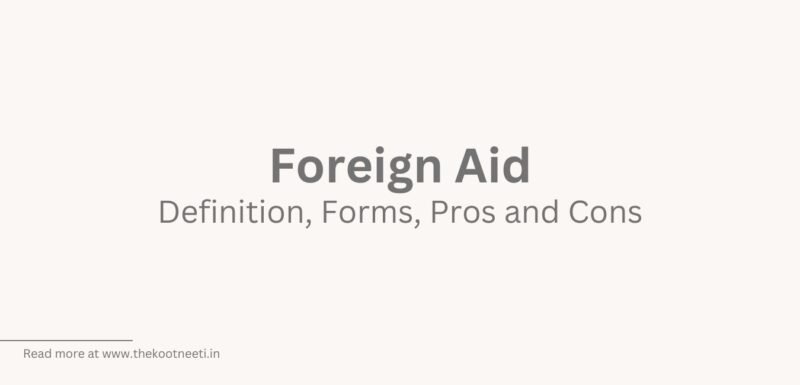Foreign Aid: Definition, Forms, Pros and Cons

Foreign aid is assistance provided by one country to another country, typically in the form of financial or technical assistance. Foreign aid can be provided for a variety of reasons, such as to promote economic development, to address humanitarian needs, or to advance foreign policy objectives.
Foreign aid can take many forms, including grants, loans, technical assistance, and in-kind assistance, such as food, medical supplies, or other types of assistance. It can be provided by governments, international organizations, or non-governmental organizations (NGOs).
Foreign aid is a controversial issue, with some arguing that it is necessary to address poverty and other global challenges, while others argue that it can be wasteful or ineffective, or that it can have unintended consequences. There are also debates about the appropriate level of foreign aid, with some arguing that it should be increased, while others argue that it should be reduced or eliminated.
There are many different forms of foreign aid that can be provided to countries in need. Some common forms of foreign aid include:
- Financial assistance: This can include grants or loans to help countries meet their basic needs or invest in development projects.
- Humanitarian aid: This type of aid is provided in the form of goods or services to help meet the basic needs of people affected by emergencies, such as natural disasters or armed conflicts.
- Technical assistance: This can include providing expertise or training to help countries develop their infrastructure, institutions, and capacity to address development challenges.
- Development aid: This type of aid is aimed at promoting long-term economic and social development in recipient countries, and can include funding for projects in areas such as education, healthcare, and agriculture.
- Military aid: This can include providing military equipment, training, and other support to countries for the purpose of strengthening their defence capabilities.
- Debt relief: This can involve providing financial assistance to help countries pay off their debts, or restructuring their debt to make it more manageable.
There are both pros and cons to foreign aid, and opinions on the effectiveness of foreign aid can vary depending on the specific context and the goals of the aid. Some of the main pros and cons of foreign aid are as follows:
Pros:
- Reducing poverty: Foreign aid can help to reduce poverty by providing financial assistance and resources to countries that are struggling economically. It can also help to promote economic development and to create job opportunities in recipient countries.
- Addressing humanitarian needs: Foreign aid can help to address humanitarian crises, such as in the aftermath of natural disasters or conflicts, by providing food, shelter, medical supplies, and other types of assistance.
- Promoting stability: Foreign aid can help to promote stability in recipient countries by addressing the root causes of conflicts and by supporting economic and social development.
Cons:
- Dependency: Some argue that foreign aid can create dependency on aid among recipient countries, which can discourage economic development and undermine local initiatives.
- Corruption: Foreign aid can be vulnerable to corruption, with some arguing that it can end up in the hands of elites or be used for non-developmental purposes.
- Effectiveness: There are debates about the effectiveness of foreign aid, with some arguing that it can be ineffective or inefficient, or that it can have unintended consequences.
- Political considerations: Some argue that foreign aid can be used as a tool for advancing foreign policy objectives or for influencing the domestic politics of recipient countries.
Overall, foreign aid can have both positive and negative impacts, and its effectiveness can depend on a variety of factors,


















